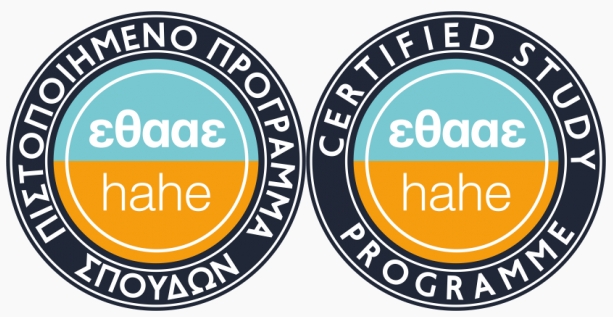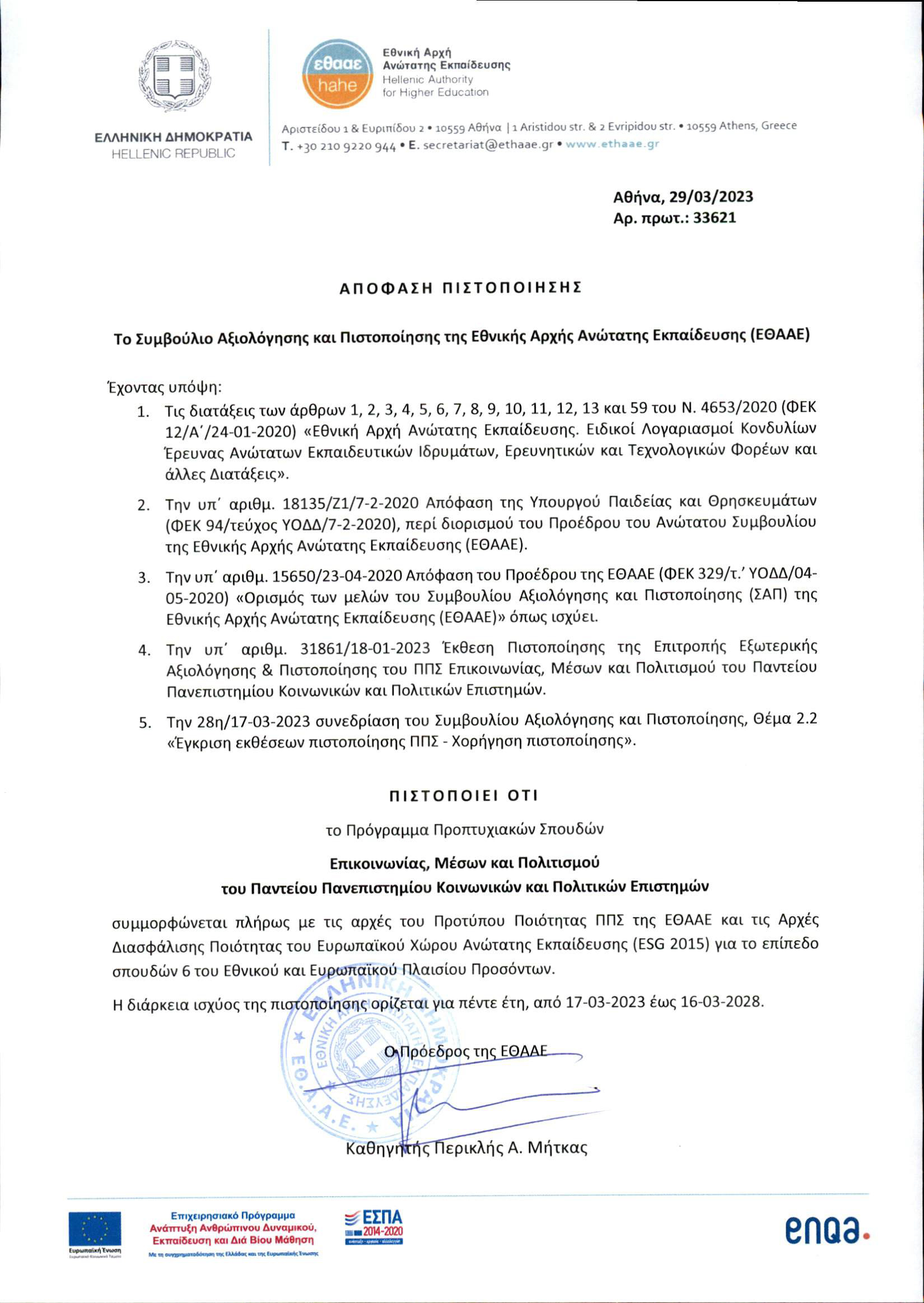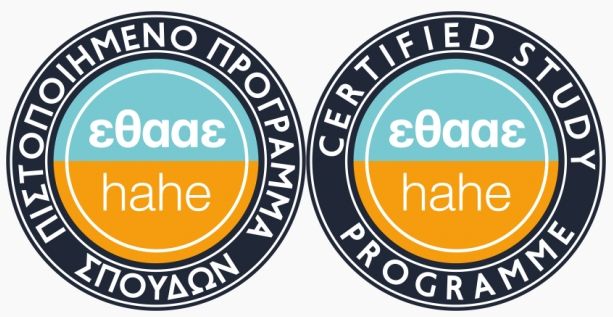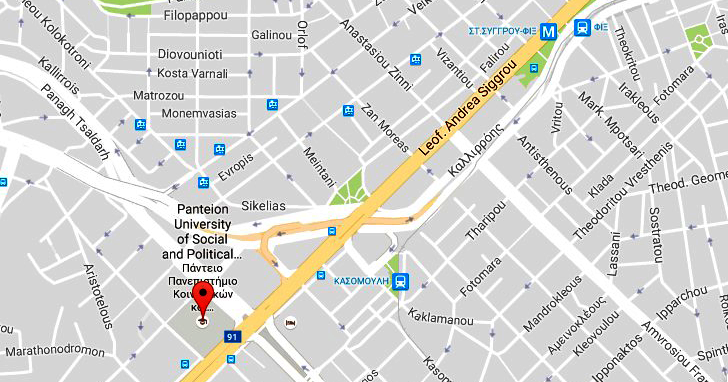Here you can view the list of courses (with a description of their content) taught entirely in English, offered to incoming Erasmus+ students for the academic year 2022-2023
SECOND YEAR - FALL SEMESTER
410322. Sociology of the Internet
Instructor: Pantelis Vatikiotis
The course probes into historical, cultural and theoretical aspects of the internet (part I); it draws on key dimensions of the intersection of digital media and society (part II); and it evaluates social, economic and political consequences of contemporary uses of the internet (part III).
Course Objectıves
- sketches the development of the internet
- examines normative aspects/features of the web and social media
- iscusses diverse theoretical approaches of the information/network society
- explores the interplay between the digital and the social
- analyzes controversial issues raised in reference to networking and collaboration, representation, and participation, claiming and doing politics
Course Outcomes
Upon successful completion of the course, the student will:
- understand the technological and socio-cultural context of the internet
- identify main characteristics and principles of the digital media
- grasp key debates and perspectives concerning new media
- develop analytical skills appropriate to evaluate social, economic, and political implications of digitalization on media, communication and culture critically engage in new media formats
410913. English Language for Media and Communication
Instructor: Patricia Kokkori
This course provides a working knowledge of media vocabulary and is designed primarily to develop confidence in spoken and written English for occupational and academic writing purposes. To achieve this double objective, the focus in class is on detailing the features of print, digital and broadcast media as we consolidate vocabulary for discussing the most pressing issues at present, and on critiquing a body of media materials (photojournalism, documentary, advertisement) and non-mainstream films on journalism that evolve or subvert the Hollywood model feature film. We examine how the codes and conventions of the different genres function as formulae to inform, divert, persuade and please audiences, and how they shape social perception. To discover what the audience is being persuaded we explore major contributions of different theories to critical analysis (semiotics, deconstruction and spectatorship). Our primary concern is to determine not only the persuasive techniques in the diverse utterances of print, screen and audio-visual genres but how they capture or construct realities.
Students are expected to demonstrate competence in using specialist and general vocabulary for discussing current affairs with informed opinion and by drawing on concepts studied for analysing narratives, production techniques, representations and stereotyping when they come to assess media material in an essay. The course also seeks to actively engage students in weekly tasks that foster the use of theme based vocabulary in discussions and writing activities.
Learning outcomes
A. Knowledge and Understanding
By the end of the semester students should be able to:
- read journalistic articles and book chapters rapidly to find specific information and get an overall impression of the content
- take notes and summarize articles or book chapters in some detail
- listen to spoken English in interviews, news broadcasts, documentaries and films, for general impression and specific information
- recognise rhetorical tropes, production and narrative techniques, in journalism, advertising art reviews, television drama and film
- give personal responses with evaluative language
- write a comment piece, summary and short academic essay
B. Intellectual abilities:
By the end of the semester students should be able to:
- show some critical awareness of the language and forms used in media
- recognise representations and stereotyping in media
- raise questions about the functions of media
- draw on bibliography to formulate a research topic and produce a case study
C. General Competencies:
By the end of the semester students should:
- have understood the importance of forming informed opinion
- have developed competence in acceptance of gender & cultural ‘otherness’
- have become more confident in expressing their own views in their second language
- have become more autonomous learners
SECOND YEAR - SPRING SEMESTER
410216. Introduction to Advertising and Public Relations
Instructor: Betty Tsakarestou
This is an experiential course- we call it the AD Discovery Workshop- introducing the participants, both Panteion and Eramsus+ students, to the latest and more transformative developments in the communication business world.
We explore together, based on students-led projects, how the global players are adapting rapidly to transformational digital tech changes, experimenting with Artificial Intelligence, Virtual Reality, Immersive. Empathy and Storytelling technologies. We get to know the media influencers and entrepreneurial minds worldwide that are bridging Advertising, PR and Media in new business models, connecting and collaborating with their audiences and communities, adapting, leading, competing and collaborating to harness the power of technological and communication changes that are shaping our present and revolutionizing our future.
Students form their own international communication simulation agencies or native/ branded media startups and are invited to build and provide a digital storytelling and communication solution with positive market and social impact.
Topics we focus on: Branding, Reputation Management, Digital Strategies, Native Content and Branded Storytelling, Stakeholders and Users Experience, Engagement and Listening Strategies, Influencers marketing, Sustainability, Immersive Tech related Ethical, Accountability and Social impact Dilemmas, Crisis Communication, Storytelling, Pitching and Presentation Skills].
Learning outcomes:
- Teamwork- collaborative skills in physical and online environments/ platforms
- Challenges- based projects in an international context
- Innovation- ideas production and implementations
- Applying Design Thinking and Critical Thinking in real world situations
- Decision-making in complex and uncertain environments
- Critical and creative thinking
- Digital skills and digital creativity
- Ethical and social/ environmental responsibility reasoning and decision making
THIRD YEAR - FALL SEMESTER
410204. Social Issues, Social innovation and Corporate Responsibility
Instructor: Betty Tsakarestou
A social innovation and real-world impact experiential course that focuses on the major global social, environmental and economic challenges aligned with UN Sustainable Development Goals: “The Sustainable Development Goals are the blueprint to achieve a better and more sustainable future for all. They address the global challenges we face, including those related to poverty, inequality, climate, environmental degradation, prosperity, and peace and justice”.
The main question to be addressed is: How we can envision and co-create new responses to 21 Century challenges. Real case-scenarios based on current global or local challenges, issues and crises are discussed.
Our creative project is featured in “Dare to Challenge” Medium Publication to engage participating student teams in learning to think and act as social impact innovators, as local and global networked citizens, to take the lead and responsibility to create positive impact and change in their communities and in broader society, offline and online.
Sustainable innovation agenda is inspiring worldwide a new breed of social impact entrepreneurs, prioritizing collaborative action, bringing together innovators from public, private and social, cultural and technology sectors. Our blended learning journey, following the design thinking methodology, is engaging participants to think and work as human-centric social innovation solutions designers in collaboration with civic communities and stakeholders.
410339. Literacy in digital media and information: Theory and Practice
Instructor: Vasilis Roungas
The way users and professionals interact with digital media and information has dramatically changed over the last decade. Nowadays, being involved in these fields necessitates for a solid understanding of new technologies, which are, undoubtedly, rapidly evolving. This course focuses on the theoretical and practical applications of new technologies and contemporary methods used in digital media. Given that algorithms constitute the core of every technology, the first part of the course will revolve around understanding how these do work. We will then examine three areas:
- Immersive technologies, like virtual and augmented reality, and transmedia navigation.
- Artificial Intelligence (AI).
- Blockchain.
Following the successful completion of the course, students should have the knowledge and ability to:
- Understand the basics of algorithms and how they are used in digital media.
- Understand the different technologies and how they affect content in digital media.
- Identify the advantages and disadvantages of the abovementioned technologies.
Comprehend the ethical issues arising from the usage of the abovementioned technologies.
Κέντρο εξυπηρέτησης φοιτητών (Κ.Ε.ΦΟΙ.)
Από το Κέντρο Εξυπηρέτησης Φοιτητών χορηγούνται:
- βεβαιώσεις σπουδών
- πιστοποιητικά στρατολογίας
- αναλυτικές βαθμολογίες
- βεβαιώσεις εφορίας
- αντίγραφα πτυχίων
- βεβαιώσεις στεγαστικού επιδόματος για προπτυχιακούς/ές και μεταπτυχιακούς/ές φοιτητές/τριες.
Το Τμήμα Φοιτητικής Μέριμνας-Κέντρο Εξυπηρέτησης Φοιτητών λειτουργεί καθημερινά από 08:00 έως 14:30.
Open eClass: Πλατφόρμα Ασύγχρονης Τηλεκπαίδευσης
Η πλατφόρμα Πάντειο Open eClass αποτελεί ένα ολοκληρωμένο Σύστημα Διαχείρισης Ηλεκτρονικών Μαθημάτων. Ακολουθεί τη φιλοσοφία του λογισμικού ανοικτού κώδικα και υποστηρίζει την υπηρεσία Ασύγχρονης Τηλεκπαίδευσης. Η είσοδος σε αυτήν πραγματοποιείται με τους κωδικούς URegister που χρησιμοποιούνται στον ΕΥΔΟΞΟ και στις ηλεκτρονικές δηλώσεις μαθημάτων.
Βρείτε εδώ τις οδηγίες για την βέλτιστη χρήση της πλατφόρμας eClass, σχετικά με:
- Πρόσβαση στην πλατφόρμα eClass
- Εγγραφή σε μαθήματα
- Τρόποι ενημέρωσης για ανακοινώσεις
- Τεχνικά για το eClass – helpdesk
Βιβλιοθήκη και Κέντρο Πληροφόρησης
Στο Πάντειον Πανεπιστήμιο Κοινωνικών και Πολιτικών Επιστημών λειτουργεί ενιαία Κεντρική «Βιβλιοθήκη και Κέντρο Πληροφόρησης» Παντείου Πανεπιστημίου (ΒιΚεΠ). Σκοπός της ΒιΚεΠ είναι η κάλυψη, η υποστήριξη και η προώθηση των εκπαιδευτικών και ερευνητικών δραστηριοτήτων του Ιδρύματος, στο πλαίσιο των προπτυχιακών και μεταπτυχιακών προγραμμάτων σπουδών των Τμημάτων, και η διεύρυνση των ακαδημαϊκών στόχων και του κοινωνικού ρόλου του Παντείου Πανεπιστημίου. Σκοπός της, επίσης, είναι η συμβολή της στη διαχείριση, παροχή και διάθεση εξειδικευμένων πληροφοριών στην ευρύτερη εθνική και υπερεθνική κοινότητα, καθώς και η συμμετοχή της σε κάθε δραστηριότητα για την παιδεία και τον πολιτισμό. Η ΒιΚεΠ είναι μέλος του Συνδέσμου Ελληνικών Ακαδημαϊκών Βιβλιοθηκών, ανοικτής πρόσβασης και προσφέρει τις υπηρεσίες της σε όλα τα μέλη της ακαδημαϊκής κοινότητας του Παντείου καθώς και σε ενδιαφερόμενα εξωτερικά μέλη.
Σύμβουλοι Σπουδών
Οι Σύμβουλοι Σπουδών του Τμήματος είναι μέλη ΔΕΠ που υποστηρίζουν τους/τις φοιτητές/τριες σε θέματα σπουδών και φοίτησης όπως:
-
μετάβαση από τη δευτεροβάθμια στην τριτοβάθμια εκπαίδευση (ειδικά για τους πρωτοετείς φοιτητές/τριες)
-
ενημέρωση αναφορικά με τη λειτουργία του Προγράμματος Σπουδών του Τμήματος και την υπόδειξη πιθανών συνδυασμών μαθημάτων
-
συζήτηση γενικών θεμάτων τα οποία οι φοιτητές/τριες θεωρούν πως μπορεί να παρακωλύουν την εξέλιξη των σπουδών τους
-
ενημέρωση για μεταπτυχιακές σπουδές μετά την αποφοίτηση
-
οι Σύμβουλοι Σπουδών απευθύνονται στα υπόλοιπα μέλη ΔΕΠ του Τμήματος, στα οποία ανά περίπτωση αναθέτουν την ενημέρωση/υποστήριξη φοιτητών/τριών
Ως Σύμβουλοι Σπουδών για το ακαδημαϊκό έτος 2023-2024 έχουν οριστεί από τη Γενική Συνέλευση του Τμήματος τα παρακάτω μέλη ΔΕΠ:
| ΠΡΟΠΤΥΧΙΑΚΟ ΠΡΟΓΡΑΜΜΑ ΣΠΟΥΔΩΝ | ||
|
|
||
|
Αναπληρώτρια Καθηγήτρια Ιωάννα Βώβου
|
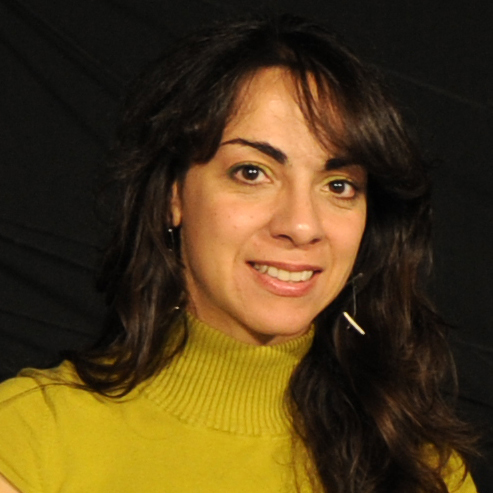 |
|
|
Επίκουρη Καθηγήτρια Πατρίσια Κόκκορη
|
 |
|
| ΜΕΤΑΠΤΥΧΙΑΚΟ ΠΡΟΓΡΑΜΜΑ ΣΠΟΥΔΩΝ | ||
|
Επίκουρη Καθηγήτρια Μάρθα Μιχαηλίδου
|
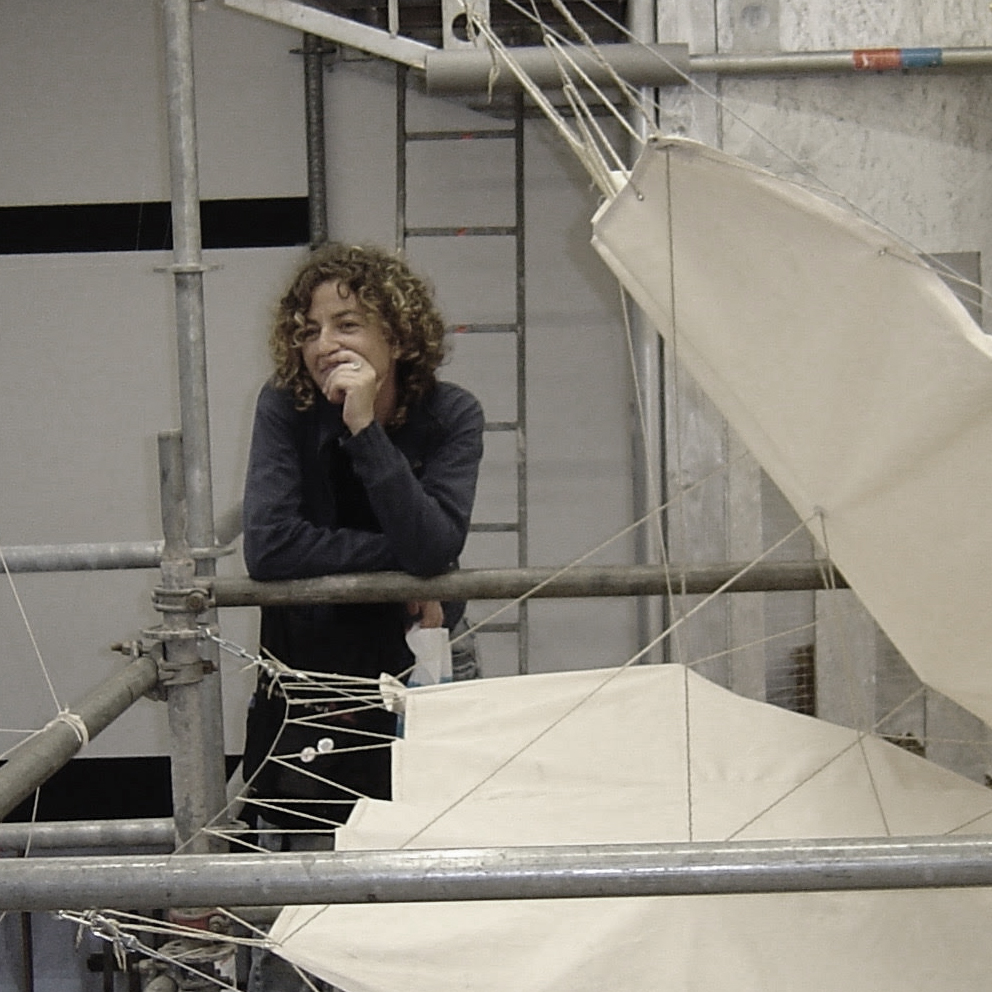 |
Συνήγορος του Φοιτητή
Το Πάντειο Πανεπιστήμιο έχει συστήσει αυτοτελές «Γραφείο Συνηγόρου Φοιτητή», στο οποίο κάθε φοιτητής/τρια μπορεί, με τη χρήση ειδικού εντύπου να αναφέρει οποιοδήποτε πρόβλημα μεταξύ (α) του φοιτητή/τριας και (β) διδασκόντων ή διοικητικών υπηρεσιών, με σκοπό τη διαμεσολάβηση του Συνηγόρου για την επίλυσή του
Στο Πάντειον Πανεπιστήμιο λειτουργεί Γραφείο Διασύνδεσης για τους/τις φοιτητές/τριες, αποστολή του οποίου είναι η προσφορά υπηρεσιών υψηλής ποιότητας τόσο προς την εκπαιδευτική κοινότητα όσο και προς τις επιχειρήσεις Ιδιωτικού και Δημοσίου Τομέα, Οργανισμούς, Υπηρεσίες Τοπικής Αυτοδιοίκησης και Συλλογικούς Φορείς για την επίτευξη των παρακάτω σκοπών:
α) της διασύνδεσης, διαμεσολάβησης μεταξύ του Ιδρύματος και φορέων εκπαίδευσης, έρευνας, παραγωγής και υπηρεσιών, επικοινωνίας με τους φοιτητές/αποφοίτους του Ιδρύματος και
β) της προαγωγής της καινοτομίας και της επιχειρηματικότητας.
Στις υπηρεσίες του Γραφείου Διασύνδεσης περιλαμβάνονται:
- Η ατομική συμβουλευτική υποστήριξη των φοιτητών/τριών σε θέματα σπουδών και σταδιοδρομίας.
- Η διοργάνωση εκδηλώσεων ενημέρωσης και δικτύωσης με την αγορά εργασίας.
- Η υλοποίηση ομαδικών συμβουλευτικών συναντήσεων και εργαστηρίων για την ανάπτυξη κοινωνικών δεξιοτήτων και την ενίσχυση της επαγγελματικής ετοιμότητας των φοιτητών/τριών και αποφοίτων του Ιδρύματος.
- Η κοινοποίηση ανακοινώσεων που σχετίζονται με τις ακαδημαϊκές και επαγγελματικές επιλογές των επωφελουμένων μας (μεταπτυχιακά προγράμματα, υποτροφίες, διαγωνισμοί, θέσεις εργασίας, ευκαιρίες απόκτησης εργασιακής εμπειρίας κ.ά)
- Η συνεχής επικοινωνία και διερεύνηση προοπτικών συνεργασίας με τους/τις αποφοίτους του Πανεπιστημίου, με επιστημονικούς, ακαδημαϊκούς και επαγγελματικούς φορείς και με ελληνικές και ξένες επιχειρήσεις.
Υπηρεσία Συμβουλευτικής και Ψυχολογικής Υποστήριξης
Βασικός στόχος της υπηρεσίας είναι η παροχή υπηρεσιών Συμβουλευτικής μέσω ατομικών και ομαδικών συναντήσεων. Επιτυγχάνοντας στόχους όπως η καλύτερη προσαρμογή των φοιτητών στο Πανεπιστήμιο, βελτίωση της επίδοσης των σπουδών, βελτίωση της μαθησιακής διαδικασίας, αντιμετώπιση της αναβλητικότητας, υποστήριξη στη διαδικασία λήψης αποφάσεων για εκπαιδευτικά, επαγγελματικά και προσωπικά ζητήματα, διαχείριση συγκρούσεων, ανάπτυξη της ψυχικής ανθεκτικότητας, ευημερία και ποιότητα ζωής.
Με απόφαση της Συγκλήτου, συγκροτήθηκε η πρώτη Επιτροπή Ισότητας των Φύλων (Ε.Ι.Φ.) στην ιστορία του πανεπιστημίου μας, σε εφαρμογή του νόμου 4589/2019 (άρθρο 33)
Η Ε.Ι.Φ. έχει σύμφωνα με το νόμο τις εξής αρμοδιότητες:
- Εκπονεί σχέδια δράσης για την προώθηση και διασφάλιση της ουσιαστικής ισότητας στις εκπαιδευτικές, ερευνητικές και διοικητικές διαδικασίες του Ιδρύματος και καταρτίζει ετήσια έκθεση, την οποία υποβάλλει στη Σύγκλητο,
- Εισηγείται στα αρμόδια όργανα μέτρα για την προώθηση της ισότητας και την καταπολέμηση του σεξισμού,
- Παρέχει ενημέρωση και επιμόρφωση στα μέλη της ακαδημαϊκής κοινότητας σε θέματα σχετικά με το φύλο και την ισότητα,
- Παρέχει υπηρεσίες διαμεσολάβησης σε περιπτώσεις καταγγελιών για διακριτική μεταχείριση ή παρενοχλητική συμπεριφορά,
- Προωθεί την εκπόνηση Π.Μ.Σ. και τη διενέργεια σεμιναρίων και διαλέξεων που εστιάζουν στη μελέτη του φύλου,
- Προωθεί την εκπόνηση μελετών και ερευνών σχετικά με θέματα που σχετίζονται με το πεδίο της αρμοδιότητάς της,
- Παρέχει συνδρομή προς θύματα διακρίσεων όταν καταγγέλλουν διακριτική μεταχείριση.
Ηλεκτρονική διεύθυνση επικοινωνίας: This email address is being protected from spambots. You need JavaScript enabled to view it.
Δωρεάν Συγγράμματα
Οι ενεργοί/ές προπτυχιακοί/ές φοιτητές/τριες δικαιούνται να επιλέξουν ένα σύγγραμμα για κάθε μάθημα. Συγγράμματα που επιλέγονται σε μαθήματα που δενπεριλαμβάνονται στη δήλωση μαθημάτων του/της φοιτητή/τριας πρέπει να επιστρέφονται, σύμφωνα με τη διαδικασία που προβλέπεται από την ηλεκτρονική υπηρεσία «ΕΥΔΟΞΟΣ». Δεν χορηγούνται σε φοιτητές/τριες δωρεάν διδακτικά συγγράμματα για μαθήματα που παρακολουθούν για δεύτερη φορά, για τα οποία τους έχει ήδη χορηγηθεί δωρεάν σύγγραμμα. Δικαίωμα δωρεάν συγγραμμάτων διαθέτουν και οι φοιτητές/τριες που παρακολουθούν πρόγραμμα σπουδών για τη λήψη δεύτερου πτυχίου.
Φοιτητική Μέριμνα & Λοιπές Υποστηρικτικές Παροχές
Στους φοιτητές προσφέρονται οι ακόλουθες παροχές:
- Ελεύθερο wifi στους χώρους του Πανεπιστημίου,
- Δωρεάν διδασκαλία ξένων γλωσσών από το αρμόδιο Τμήμα του Ιδρύματος,
- Πλήρης ιατροφαρμακευτική και νοσοκομειακή περίθαλψη,
- Άθληση στο Πανεπιστημιακό Γυμναστήριο
- Δωρεάν σίτιση (υπό προϋποθέσεις),
- Στέγαση (υπό προϋποθέσεις).
Acting on the Department's recommendations Panteion University has granted Honorary Doctorate degrees
to philosophers Kostas Axelos (1992) & Jacques Derrida (1999)
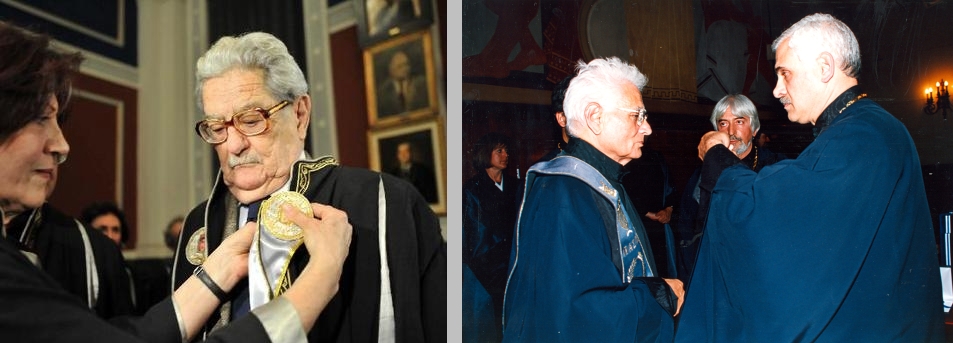
 2022 - H Επίκουρη Καθηγήτρια Δήμητρα Ιορδάνογλου, η οποία ως υπότροφος Fulbright Visiting Scholar επισκέφτηκε το Stevens Institute of Technology των ΗΠΑ, επελέγη από το Ίδρυμα Fulbright σε ρόλο πρεσβευτή (Fulbright Outreach Ambassador) προγραμμάτων και υπηρεσιών του Fulbright σε Έλληνες που επιθυμούν να σπουδάσουν στις Ηνωμένες Πολιτείες και σε Αμερικανούς που προσβλέπουν σε συνεργασία με την ελληνική πανεπιστημιακή κοινότητα.
2022 - H Επίκουρη Καθηγήτρια Δήμητρα Ιορδάνογλου, η οποία ως υπότροφος Fulbright Visiting Scholar επισκέφτηκε το Stevens Institute of Technology των ΗΠΑ, επελέγη από το Ίδρυμα Fulbright σε ρόλο πρεσβευτή (Fulbright Outreach Ambassador) προγραμμάτων και υπηρεσιών του Fulbright σε Έλληνες που επιθυμούν να σπουδάσουν στις Ηνωμένες Πολιτείες και σε Αμερικανούς που προσβλέπουν σε συνεργασία με την ελληνική πανεπιστημιακή κοινότητα.
2022 - H Επίκουρη Καθηγήτρια Δήμητρα Ιορδάνογλου, τιμήθηκε με το βραβείο Υψηλής Διδακτικής Επίδοσης από το Διατμηματικό Πρόγραμμα Μεταπτυχιακών Σπουδών στη Διοίκηση Ανθρώπινου Δυναμικού του Οικονομικού Πανεπιστημίου Αθηνών για τη διδασκαλία του μαθήματος "Διαχείριση Ποικιλομορφίας και Εσωτερική Συμβουλευτική".
 Κατά τα ακαδημαϊκά έτη 2021-2022 και 2022-2023, η Χρυσάνθη Αυλάμη, επίκουρη καθηγήτρια Ιστορίας των ιδεών, κλήθηκε να διδάξει στο πανεπιστήμιο της Σορβόννης (Département de Lettres classiques de l’Université Paris-Sorbonne) το μάθημα "Εισαγωγή στις σπουδές πρόσληψης της Αρχαιότητας" (επίπεδο Master 2), το μάθημα " Αρχαίοι" και "Νεώτεροι" την εποχή των Φώτων (επίπεδο Master 2) καθώς επίσης και φροντιστηριακά μαθήματα (επίπεδο L2, L3)
Κατά τα ακαδημαϊκά έτη 2021-2022 και 2022-2023, η Χρυσάνθη Αυλάμη, επίκουρη καθηγήτρια Ιστορίας των ιδεών, κλήθηκε να διδάξει στο πανεπιστήμιο της Σορβόννης (Département de Lettres classiques de l’Université Paris-Sorbonne) το μάθημα "Εισαγωγή στις σπουδές πρόσληψης της Αρχαιότητας" (επίπεδο Master 2), το μάθημα " Αρχαίοι" και "Νεώτεροι" την εποχή των Φώτων (επίπεδο Master 2) καθώς επίσης και φροντιστηριακά μαθήματα (επίπεδο L2, L3)
 2014 - Officier de l' Ordre des Palmes Academiques de la Republique Francaise
2014 - Officier de l' Ordre des Palmes Academiques de la Republique Francaise
2016 - Κρατικό Βραβείο Λογοτεχνίας
2016 - Βραβείο Ουράνη Ακαδημίας Αθηνών
2020-2021. «Corona Surveys» 1. διάκριση στο «The COVID-19 Symptom Data Challenge» https://symptomchallenge.org. και 2. διάκριση (top 10 teams διεθνώς) στο XPRIZE Pandemic Response Challenge: https://www.businesswire.com/news/home/20210309005419/en

Το βιβλίο της Καθηγήτριας Μαρία Κακαβούλια Μορφές και Λέξεις στο έργο της Ελένης Βακαλό (2005), τιμήθηκε από το Υπουργείο Πολιτισμού με το κρατικό βραβείο δοκιμίου και κριτικής του 2006.
Σταύρος Καπερώνης
 2017- Το βραβείο καλύτερου άρθρου (Best paper award) απονεμήθηκε στον κκ Dr. Stavros Kaperonis (ΕΔΙΠ του Τμήματος Επικοινωνίας, Μέσων και Πολιτισμού) και τους Dimitris Kardaras (Επίκουρο Καθηγητή του Τμήματος Οργάνωσης και Διοίκησης Επιχειρήσεων του ΟΠΑ), Bill Karakostas (Διευθυντή τεχνολογιών cloud, VLTN GCV, Βέλγιο), Stavroula Barbounaki (Merchant Marine Academy of Aspropyrgos) και Anastasios Papadopoulos (Οικονομικό Πανεπιστήμιο Αθηνών), για το άρθρο τους "Integrating the Balanced Scorecard and Web Analytics for Strategic Digital Marketing: A Multi-criteria Approach using DEMATEL" το οποίο παρουσιάστηκε στο διεθνές συνέδριο The Sixth International Conference on Data Analytics, 2017, στην Βαρκελώνη, Ισπανία τον Νοέμβριο 2017.
2017- Το βραβείο καλύτερου άρθρου (Best paper award) απονεμήθηκε στον κκ Dr. Stavros Kaperonis (ΕΔΙΠ του Τμήματος Επικοινωνίας, Μέσων και Πολιτισμού) και τους Dimitris Kardaras (Επίκουρο Καθηγητή του Τμήματος Οργάνωσης και Διοίκησης Επιχειρήσεων του ΟΠΑ), Bill Karakostas (Διευθυντή τεχνολογιών cloud, VLTN GCV, Βέλγιο), Stavroula Barbounaki (Merchant Marine Academy of Aspropyrgos) και Anastasios Papadopoulos (Οικονομικό Πανεπιστήμιο Αθηνών), για το άρθρο τους "Integrating the Balanced Scorecard and Web Analytics for Strategic Digital Marketing: A Multi-criteria Approach using DEMATEL" το οποίο παρουσιάστηκε στο διεθνές συνέδριο The Sixth International Conference on Data Analytics, 2017, στην Βαρκελώνη, Ισπανία τον Νοέμβριο 2017.
2018 - Το βραβείο καλύτερου άρθρου (Best paper award) απονεμήθηκε στον κκ Dr. Stavros Kaperonis (ΕΔΙΠ του Τμήματος Επικοινωνίας, Μέσων και Πολιτισμού) και τους Dimitris Kardaras (Επίκουρο Καθηγητή του Τμήματος Οργάνωσης και Διοίκησης Επιχειρήσεων του ΟΠΑ), Stavroula Barbounaki (Merchant Marine Academy of Aspropyrgos) και Ilias Petrounias (University of Manchester), για το άρθρο τους: "An Approach to Web Adaptation by Modelling User Interests Using TF-IDF: A Feature Selection and Multi-criteria Approach Using AHP" το οποίο παρουσιάστηκε στο διεθνές συνέδριο, The Thirteenth International Multi-Conference on Computing in the Global Information Technology, HUSO 2018, June 24-28, 2018 - Venice, Italy.
2018 -Το βραβείο καλύτερου άρθρου (Best paper award) απονεμήθηκε στον κκ Dr. Stavros Kaperonis (ΕΔΙΠ του Τμήματος Επικοινωνίας, Μέσων και Πολιτισμού) για το άρθρο του: "The Impact of Social Media on User's Travel Purchase Intention", το οποίο παρουσιάστηκε στοδιεθνές συνέδριο, The Seventh International Conference on Data Analytics 2018, November 18, 2018 to November 22, 2018 - Athens, Greece, και έλαβε πρόσκληση για extended article version στο IARIA Journals. To extended article vervion με τίτλο How Social Media Factors Influence User's Travel Purchase Intention δημοσιεύτηκε το 2019.




